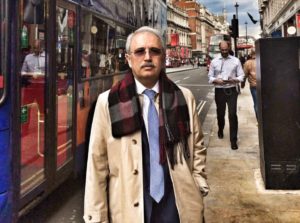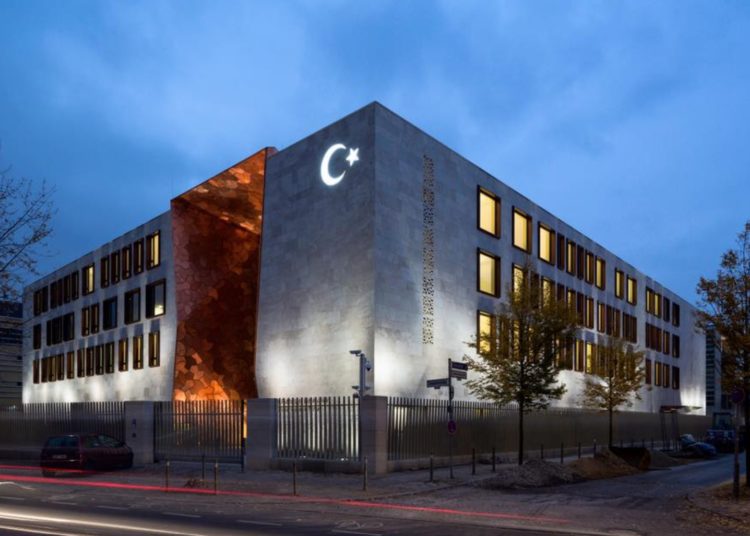Abdullah Bozkurt/Stockholm
Turkish intelligence agency MIT operatives as well as diplomats in Germany have infiltrated refugee camps to spy on unsuspecting asylum seekers who seek protection from the oppressive regime of President Recep Tayyip Erdoğan.
According to a secret Turkish government document obtained by Nordic Monitor, four Turks were identified by agents of the Erdoğan government as residents of refugee camps. The document was issued by the Security General Directorate (Emniyet) and sent to the chief public prosecutor’s office in the province of Gaziantep, where all four have birth registry records.
That suggests the Emniyet also issued similar documents for other provinces, which means more people were profiled and spied on in German refugee camps. The document was dated April 18, 2019 and signed by Oğuzhan Yonca, deputy chief of Smuggling and Organized Crime Directorate (KOM).
Yonca referred to both MIT and the Turkish Foreign Ministry as the source of the intelligence by identifying them as institutions IV and V, respectively. The Turks targeted by MIT were alleged to have been affiliated with the Gülen movement, led by US-based Turkish Muslim scholar Fethullah Gülen, an outspoken critic of the Erdoğan government on a range of issues from corruption to Turkey’s aiding and abetting of radical groups in Syria and Libya.
Secret Turkish government document on espionage activities in Germany:
The document confirms that the Turkish spy agency’s clandestine activities have continued in Germany despite the fact that MIT’s surveillance has become a thorny issue in the relations between the two countries. It also exposes how the Turkish government has been using diplomats and consular officers assigned to work in Germany as undercover agents to spy and collect information in its NATO ally’s territory in a blatant violation of the relevant Vienna Conventions.
The immunities and privileges of diplomats and consular staff are governed by international conventions. Diplomats enjoying the privileges and immunities described in the Vienna Convention on Diplomatic Relations are under a duty to respect the laws and regulations of the receiving state and to avoid interfering in its internal affairs as detailed in Article 41.
Similarly, consular staff are granted limited privileges and immunities by the Vienna Convention on Consular Affairs, but host state authorities can start investigations and prosecute any of the personnel if they perpetrate crimes inside or outside the consulate premises according to Article 43 of the convention.

The global campaign of intelligence gathering and profiling of critics and their organizations by Turkish diplomats and spies has been sanctioned by the Erdoğan government. The move, which is unprecedented in scale and intensity, created an uproar in many parts of the world, including in Europe, where Turkish diplomats came under increased scrutiny.
In one extreme case, Swiss prosecutors launched a criminal probe and issued arrest warrants for two Turkish Embassy officials for attempting to kidnap a Swiss-Turkish businessman who was critical of Erdoğan’s repressive Islamist regime in Turkey.
In 2015 the federal attorney general of Germany charged Muhammet Taha Gergerlioğlu, a close advisor of Erdoğan and a MIT operative, with espionage because he and two of his associates collected information on people of Turkish origin living in Germany who were critical of the Turkish government. Gergerlioğlu was later released as part of a political bargain between Turkey and Germany.
In July 2017 German newspaper Die Zeit reported that Turkey had handed Germany a list of 68 companies and individuals suspected of links to terrorism due to alleged ties to the Gülen movement. It was also revealed that nearly 700 German firms including industry giants Daimler and BASF were being investigated for the “financing of terrorism,” lodged with INTERPOL by Turkey. After Germany reacted strongly to the witch-hunt and threatened economic sanctions, Turkey backed down and claimed that it was simply a miscommunication.

Under the Turkish Code on Criminal Procedure, intelligence notes cannot be presented as evidence in court because of the lack of judicial review and authorization during the collection process. However, it has become common practice under the Erdoğan government to use such information in indictments and court cases filed against critics including journalists and human rights defenders. Turkish authorities often circumvent the laws on the books to make it look like the information was obtained through lawful procedures with a judge reviewing its legality.
The Erdoğan government brands all of its critics as terrorists, and 174 journalists are currently locked up in Turkish jails on terrorism charges, making Turkey the world’s leading jailer of journalists. Over 30 percent of all Turkish diplomats, 60 percent of all senior police chiefs, half of all military generals and some 30 percent of all judges and prosecutors in Turkey were also declared terrorists overnight in 2016 by the executive decisions of the Erdoğan government without any effective administrative investigation and certainly without any judicial proceedings.
Erdoğan, incriminated in a major corruption scandal in 2013 that exposed secret kickbacks in money laundering schemes involving an Iranian sanctions buster, blamed Gülen for an investigation into his family members and business and political associates. He branded the group as a terrorist entity although no violent act had been associated with it and launched a major crackdown against the group, jailing and/or purging tens of thousands of government employees, unlawfully seizing their assets and shutting down schools, universities, NGOs, media outlets, hospitals and others that were associated with the movement.












